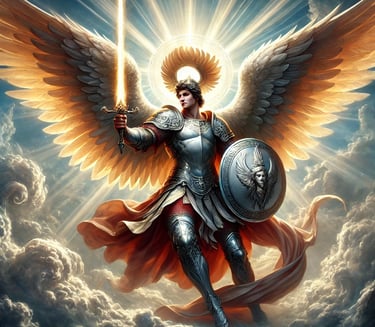The Angel Michael:
A Theological Perspective
Introduction
Michael (Hebrew: Mikha’el, “Who is like God?”) holds a revered place in Christian and Jewish theology as an archangel—a chief angelic being. He is often depicted as a heavenly prince and protector who leads the heavenly hosts in defending God’s people against the forces of evil. In religious tradition, Michael stands as the champion of divine justice and the vanquisher of evil, reflecting a shared belief in his God-given mission to safeguard the faithful.
Michael in Scripture (Christianity and Judaism)
Michael’s presence is highlighted in the sacred scriptures of both Judaism and Christianity. In the Hebrew Bible, the Book of Daniel calls Michael “one of the chief princes” and the great prince who protects Israel . He contends with angelic adversaries (the “princes” of Persia and Greece) and stands guard over God’s people, establishing the Jewish understanding of Michael as the guardian angel of the nation.
In the New Testament, Michael appears in two key passages. In Jude 1:9, “the archangel Michael” disputes with the devil over Moses’ body, but instead of cursing Satan he says, “The Lord rebuke you!” — submitting the judgment to God. And in Revelation 12:7–9, Michael leads the angels of heaven in battle to defeat “the dragon” (a symbol of Satan), casting down the evil forces from heaven. These scriptures portray Michael as a formidable warrior of God who overcomes Satan and as a protector of God’s people in the ultimate spiritual conflict.
Michael as Archangel, Protector, and Warrior
Traditional iconography portrays Archangel Michael as a winged warrior bearing a sword, reflecting his role as heaven’s foremost protector. The term archangel means “chief angel,” indicating Michael’s preeminent authority among the heavenly host. Accordingly, Christian doctrine and art depict him as the leader of the angelic armies and the champion of God’s people. Michael’s protective mission is prominent: in Daniel he is the great prince who “stands guard” over Israel, and Christian tradition likewise invokes him as guardian of the Church, defending the faithful against spiritual harm.
Michael is also celebrated as a warrior angel. He confronts demonic “princes” in Daniel’s visions and ultimately leads God’s angels to victory over the dragon in Revelation’s vision of the heavenly war. In this combat role, Michael symbolizes the triumph of God’s justice over the forces of evil. Many theologians even regard him as the heavenly counterpart to Satan – the archangel who humbles the devil’s pride and opposes his malicious work at every turn. Through these depictions, Michael is understood as both a fierce defender and a faithful servant, battling not by his own power but in the name of the Lord.
Theological Significance and Interpretations
Over centuries, theologians have attributed several important roles to Michael that deepen understanding of his significance. In Christian teaching (especially Catholic tradition), four primary offices of St. Michael are often highlighted:
Leader of Heavenly Armies: Commander of the angelic forces, the archetypal spiritual warrior who battles for the triumph of good over evil.
Angel of Death: Assistant at the hour of death, accompanying the souls of the faithful and protecting them against any final onslaught of evil.
Weigher of Souls: Holder of the scales of justice, weighing souls on Judgment Day and thus executing God’s righteous judgment.
Guardian of God’s People: Patron and protector of the people of God—esteemed in Judaism as the guardian of Israel and in Christianity as the defender of the Church.
Michael’s protective patronage has also been applied broadly – he is regarded as a heavenly patron of entire nations and of those in perilous professions (such as soldiers and police officers) who seek his safeguarding. These various roles underscore that Michael’s greatness lies in his service to God’s plan. His very name – “Who is like God?” – has been seen as a rebuke to Satan’s pride, a battle cry affirming God’s unmatched sovereignty. In Jewish tradition, likewise, Michael is revered not for his own power but as a dutiful agent of God’s mercy and justice. Both Jews and Christians view Michael as an angelic minister who points believers toward the reality of God’s protection and the ultimate victory of good over evil.
Invoking Michael’s Guidance for Protection and Strength
Believers have long sought Archangel Michael’s aid for protection, courage, and spiritual strength. In the Catholic tradition, the faithful often invoke Michael through prayer. The well-known Prayer to Saint Michael implores him to “defend us in battle” and to thwart the “wickedness and snares of the devil”. Composed by Pope Leo XIII in 1886, this prayer is still recited by many for spiritual protection, and Pope John Paul II in 1994 encouraged its use against the evils of the modern world. Devotees also pray the Chaplet of St. Michael and other litanies to seek the archangel’s intercession and help.
Beyond formal prayers, Christians may call on Michael informally in times of temptation or fear—inviting his protection with a simple plea for help. In Jewish practice, while prayer is directed to God alone, it is common to ask God for the guardianship of His angels. A traditional Hebrew bedtime prayer, for instance, includes the petition: “May Michael be at my right hand, Gabriel at my left…” —invoking Michael’s presence as a divinely appointed protector through the night. In both faiths, Michael is regarded as a powerful helper for those who seek to live faithfully. Believers find that turning to Michael for assistance not only brings a sense of security but also inspires them to emulate his humility and courage in their own spiritual battles.
Conclusion: Michael’s Ongoing Relevance in Faith
The Archangel Michael continues to have deep relevance in contemporary faith and spirituality. Each year, many churches celebrate the Feast of St. Michael (Michaelmas) on September 29, reflecting the enduring honor given to this archangel. Michael is also invoked in modern times as fervently as ever. Church leaders have reiterated the need for his protection – for example, John Paul II reaffirmed the Prayer to St. Michael as a timely “weapon” against present-day evils and darkness.
For individual believers, Michael remains a source of hope and inspiration. In a world still troubled by moral and spiritual battles, the image of the mighty archangel overcoming the dragon assures the faithful that evil can indeed be conquered by God’s power. Remembering Michael’s cry “Who is like God?” encourages humility and trust in God alone. Whether calling on Michael’s guarding presence or imitating his absolute loyalty to God, people of faith find in him a reminder that they are not alone in facing trials. Michael the archangel stands as a timeless example of faithful service and a heavenly protector who continues to watch over those who strive for righteousness, making his presence as meaningful today as it was in ancient times.


info@churchofwambo.org
© SDBEST LLC, 2025. All rights reserved.
